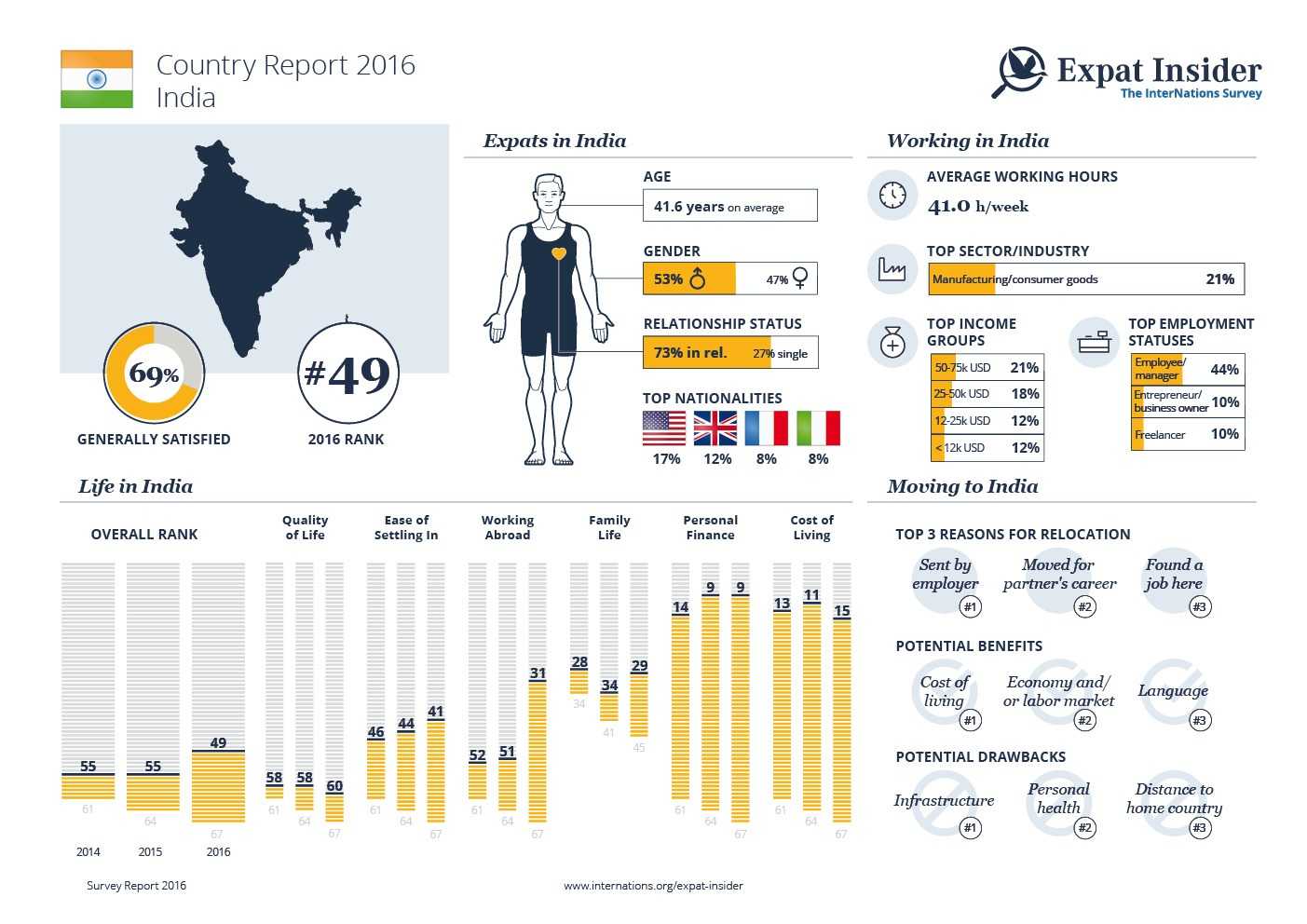Welcome to India: Chaotic and Friendly
Amidst safety concerns and low-quality healthcare, India is not an easy country to settle down in. Can the friendly population and low living costs make up for the drawbacks?
- Settling in and feeling at home is a challenge
- Quality of healthcare is low, but it’s affordable
- Not one parent thinks children’s health is very good
- International and local private schools the most popular
- Cost of living and personal finances are a plus
Expat Statistics 2016

Friendliness to Fight the Culture Shock
Settling in seems to be quite challenging in India, with only a third of the respondents there (34%) overall agreeing that it is easy to get settled, as opposed to the global average of 59%. Similarly, getting used to the local culture is considered to be at least somewhat problematic by over two-fifths (41%). So while expats in India will most likely suffer from culture shock at some point, they can at least be sure that they will be made to feel welcome in India: only one in ten expats regards the attitude towards foreign residents to be unfriendly, in contrast to the global average of 17%.
“People are really warm and loving, and I enjoy their philosophy of life.”
Low-Quality, Yet Affordable Healthcare
The quality of medical care is not too high in India, as 26% rate it negatively, compared to the global average of 20%. Consequently, India does not do too well in the Health & Well-Being subcategory of the Quality of Life Index, ranking 59th out of 67 countries. The positive thing about healthcare is that more than seven out of ten expats (71%) consider it to be overall affordable, while the global average is 55%. Still, even though healthcare is not costly, there is other bad news for expats’ health: 28% of the respondents rate the quality of the environment as very bad, as opposed to the global average of 4%.
“The air pollution and the shocking social disparities are the downside of living in India.”
Not So Peaceful India
Expats do not feel very safe in India, either. Merely five in nine expats (56%) are happy with their personal safety there, which is a significantly lower percentage than the overall average of 77%. Similarly, when it comes to peacefulness, only one in nine expats (11%) considers this very good in India (in face of the global average of 35%).
Bringing Expat Children to India
Not only are Indians kind to foreign residents, they are also friendly towards families with children, as confirmed by seven out of nine expat parents (78%). Unfortunately, respondents are not as positive about their children’s health, rated positively by only 58%, compared to the global average of 74%. In fact, not one parent in India considers it to be very good. In a similar vein, only 55% of expat parents in India rate their children’s safety positively, against a global average of 75%.
The High Price of Private Education
Expat parents are faced with further difficulties when it comes to childcare options, seeing as 38% find it challenging to secure childcare. Similarly, education option are considered to be numerous and easy to get by only 31% of the respondents with dependent children abroad, in contrast to the global average of 49%, ensuring India ranks 39th out of 45 countries in the Availability of Childcare & Education subcategory.
What is more, 48% of expat parents think education in India is pricey. However, it must be noted that 67% of them send their children to an international school, with a further 33% saying their kids are visiting local private schools. The global averages here are 32% and 21%, respectively. Not one parent says their children go to a local state school in India.
The expense at least seems to pay off, as the quality of education is considered to be very good by three out of eight expat parents (38%), a notably higher percentage than the global average of 21%.
A Rather Regular Working Life
When it comes to work life in India, things appear to be rather stable, with the country ranking an average 31st out of 67 countries in the Working Abroad Index. For instance, 55% of the respondents are satisfied with their career prospects, which is exactly the same percentage as the global average. The Indian economy, meanwhile, is regarded negatively by one-quarter, a percentage that is not too far off the worldwide average of 24%. One noteworthy fact, however, is the full-time working hours per week which average at 46.2 hours, considerably more than the global average of 44.6 hours per week.
Living like a King
A more positive picture emerges when it comes to the financial aspect of living in India. Close to seven in ten of the respondents (68%) claim that their disposable household income is overall more than enough to cover everything they need for their daily life, which is a significantly higher percentage than the global average of 48%. It is not too surprising then, that India lands on a solid ninth place in the Personal Finance Index. Similarly, the cost of living in general is rated positively by 73% of expats, positioning India at rank 15 in the Cost of Living Index.
Further Reading
Advertisement
Join InterNations
The community for expats worldwide
Download

